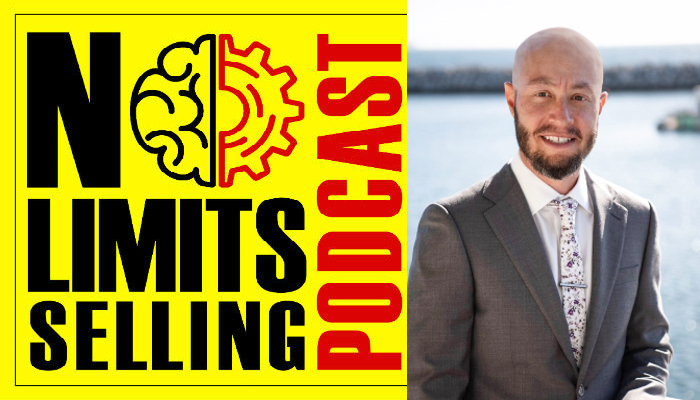How To Expand Your Sales Career by Michael Castiglione
On Episode 133 of The No Limits Selling Podcast, we have Michael Castiglione, Owner at Sandler Training - Los Angeles, CA. Mike Castiglione brings 14+ years of real world coaching, professional training, and leadership development. Mike believes that leadership is a choice and not just a rank granted by progressing through your career. True professional leadership comes from taking ownership in self-development by becoming a lifetime learner to continuously hone one’s craft.
Mike owns a Sandler Training Center in Los Angeles, where he coaches and trains sales professionals, business owners and professions through the attitudes, behaviors, and techniques that drive sales. Prior to owning a Sandler Training Center, he was a professor and director at Loyola Marymount University, where he focused on leadership development. Mike is a passionate leader that is dedicated to collaborating with professionals to build systemic and sustainable culture for business growth .

Contact Michael:
[EDITOR’S NOTE: This podcast is sponsored by No Limits Selling. It is a fun, fast-paced podcast that delivers hard-fought business advice that you can implement today to improve your sales and performance]
Interested In Our Real Estate Coaching Services? Explore Our Website: Link
Feeling Not Well Today? You Can Use Our Mindset Boosters App To amp Up Your Mood: Link
Find us on Social Media:
LinkedIn | Facebook community | Instagram
Like what do you listen to? Subscribe to our podcast!
Ready to become fearless? We can help you become fearless in 60 days so you accomplish more in your career Schedule A 15 min Call with Umar
Summary
Introduction
The podcast begins with an introduction of Michael Castiglione, the owner of Sandler Training in Los Angeles, CA. Michael is a seasoned professional with a wealth of experience in sales and business development. He has a passion for helping businesses grow and succeed by improving their sales processes and strategies.
The Importance of Sales Training
Michael emphasizes the importance of sales training in the business world. He believes that sales training is not just about teaching salespeople how to sell, but also about helping them understand the psychology behind buying decisions. This understanding allows salespeople to better connect with their customers and meet their needs.
The Sandler Selling System
Michael discusses the Sandler Selling System, a unique sales training methodology that focuses on the psychology of selling. The system is designed to help salespeople overcome common sales challenges and close deals more effectively. It includes techniques for building rapport with customers, identifying their needs, and presenting solutions in a compelling way.
The Role of Leadership in Sales
Michael also talks about the role of leadership in sales. He believes that strong leadership is crucial for a successful sales team. Leaders need to set clear expectations, provide regular feedback, and create a supportive environment where salespeople can learn and grow.
The Power of Persistence
In the podcast, Michael shares his thoughts on the power of persistence in sales. He believes that persistence is key to success in sales, as it allows salespeople to overcome obstacles and keep going even when things get tough. He shares stories and examples to illustrate his point.
Conclusion
In conclusion, the podcast featuring Michael Castiglione, owner of Sandler Training in Los Angeles, CA, delves into the intricacies of sales training and its pivotal role in business success. Castiglione underscores the significance of understanding the psychology behind buying decisions, which is central to the Sandler Selling System. This unique methodology equips salespeople with the tools to navigate common sales challenges and close deals effectively. Leadership's role in fostering a supportive environment for sales team growth is also highlighted.
The podcast underscores the power of persistence in overcoming sales obstacles, with Castiglione encouraging continuous learning, a positive mindset, and self-belief as the cornerstones of sales excellence.
Questions & Answers
What is the main focus of Michael Castiglione's podcast on sales training?
What is the Sandler Selling System that Michael Castiglione talks about?
How does Michael Castiglione view the role of leadership in sales?
What does Michael Castiglione say about the power of persistence in sales?
What are Michael Castiglione's final thoughts and advice for salespeople?
Don’t miss this opportunity to transform your real estate career with one-on-one coaching. As an experienced real estate coach, I, Umar Hameed, am dedicated to helping you unlock your full potential and achieve your real estate goals. To learn more about who am I and my clients ↓
If you’re ready to take the next step, book an appointment with me today and begin your journey toward success in the real estate industry.
